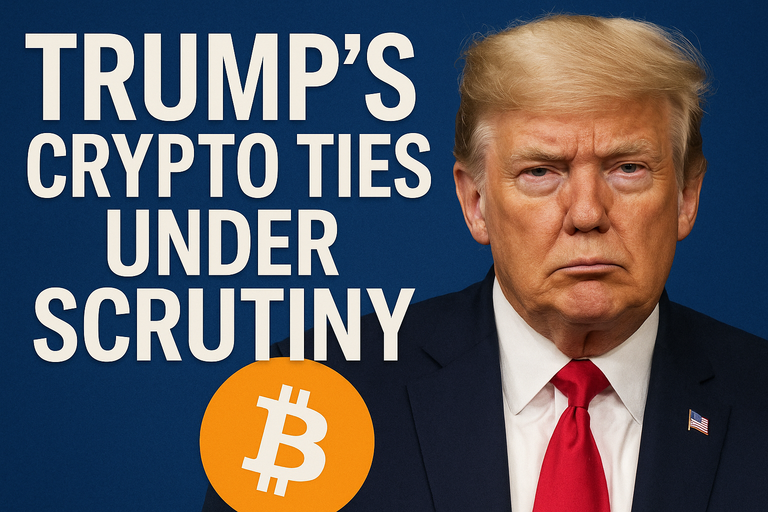Crypto Legislation at Risk? Senators Demand Probe into Trump’s Binance-Linked Deal & $TRUMP Memecoin Fundraiser
As the U.S. Senate approaches a pivotal decision on long-awaited legislation to regulate stablecoins, attention is shifting sharply toward former President Donald Trump’s increasing entanglement with the cryptocurrency sector. The spotlight on Trump’s crypto dealings comes at a sensitive time, raising questions about potential conflicts of interest, ethics violations, and the broader influence of digital assets on American politics.

The bill under scrutiny, known as the Guiding and Establishing National Innovation for U.S. Stablecoins Act (GENIUS Act), aims to establish a regulatory framework for dollar-pegged digital currencies, also known as stablecoins. These tokens, which are intended to maintain a 1:1 value with the U.S. dollar, play a central role in the broader crypto economy, facilitating everything from trading and lending to cross-border transactions. Lawmakers across both parties have shown support for some kind of federal oversight, especially after recent high-profile collapses in the crypto space eroded public trust.
But as lawmakers deliberate the bill's final language, Trump's name continues to surface—not for his policy positions, but for his financial and promotional ties to the crypto world.
Foreign Investments, Memecoins, and Ethics Concerns
Much of the controversy centers around Trump’s alleged connections to World Liberty Financial (WLF), a company reportedly involved in helping facilitate a massive $2 billion investment from the UAE-backed firm MGX Digital into Binance, the world’s largest cryptocurrency exchange. Critics argue that Trump’s relationship with WLF and the MGX deal could represent a significant conflict of interest—particularly if he were to hold office again and influence crypto policy.
Senator Elizabeth Warren (D-MA), a longtime critic of the crypto industry, and Senator Chris Murphy (D-CT) have been especially vocal, raising concerns about the implications of foreign investment in U.S.-linked crypto firms with ties to a former (and possibly future) president. In a public statement, Warren and Senator Jeff Merkley (D-OR) called for an investigation into whether the MGX investment and related actions may violate the Emoluments Clause of the U.S. Constitution, which prohibits federal officials from receiving gifts or payments from foreign states without congressional approval. They also cited potential violations of federal bribery and ethics statutes.
Adding fuel to the fire, Trump recently hosted an exclusive, high-ticket fundraising dinner at Mar-a-Lago for top buyers of his self-branded memecoin, known as $TRUMP. The token, which has surged in popularity among crypto enthusiasts, is marketed heavily with Trump’s likeness and rhetoric. Reports suggest that many attendees of the fundraiser were foreign nationals or investors with overseas ties, further raising concerns about the blending of political campaigning, personal enrichment, and international crypto finance.
A Bill Caught in the Crossfire
The GENIUS Act has been years in the making, with proponents arguing that clear, national rules are essential to prevent regulatory arbitrage, protect consumers, and support innovation. Currently, stablecoin issuers face a patchwork of state regulations that critics say are inadequate or inconsistent. The proposed legislation would set reserve requirements, define who can issue stablecoins, and establish oversight mechanisms—effectively bringing stability to a volatile corner of the financial system.
However, the emerging scandal around Trump’s crypto activities is threatening to overshadow the bill’s progress. Some senators now fear that moving forward with legislation while unresolved ethical questions linger could damage the bill’s credibility or lead to unintended consequences.
Even some Republican lawmakers—typically more supportive of crypto-friendly policy—have begun to express reservations. While not all GOP members agree with the Democratic push for an ethics probe, several have acknowledged that the optics of Trump’s fundraising and business ventures are less than ideal as Congress debates how best to regulate a trillion-dollar industry.
What's Next?
With the 2024 elections behind and 2028 on the horizon, Trump remains a dominant figure in American politics—and now, increasingly, in crypto. Whether the GENIUS Act advances this session or is delayed yet again could hinge not just on the merits of the bill, but on how the Senate chooses to handle the cloud of ethics and transparency concerns now hanging over the debate.
In the meantime, advocates for responsible crypto regulation are urging lawmakers to separate personal politics from policymaking.
“Stablecoin regulation is too important to get bogged down in scandal,” said one industry observer. “But if we don’t resolve these concerns now, they could come back to haunt us in much bigger ways later.”
As Senate debate enters its final phase, all eyes remain on both the legislation—and the man whose crypto ambitions could shape its future.
Can meaningful crypto legislation like the GENIUS Act move forward without first addressing the ethical concerns raised by Trump’s financial ties?
https://www.reddit.com/r/CryptoCurrency/comments/1kvza47/crypto_legislation_at_risk_senators_demand_probe/
This post has been shared on Reddit by @tsnaks through the HivePosh initiative.